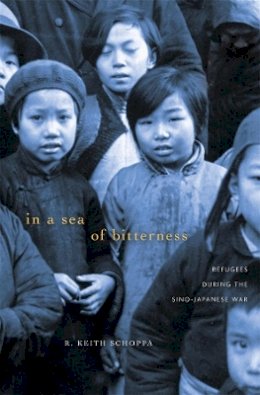
In a Sea of Bitterness: Refugees during the Sino-Japanese War
R. Keith Schoppa
The Japanese invasion of Shanghai in 1937 led some thirty million Chinese to flee their homes in terror, and live—in the words of artist and writer Feng Zikai—“in a sea of bitterness” as refugees. Keith Schoppa paints a comprehensive picture of the refugee experience in one province—Zhejiang, on the central Chinese coast—where the Japanese launched major early offensives as well as notorious later campaigns. He recounts stories of both heroes and villains, of choices poorly made amid war’s bewildering violence, of risks bravely taken despite an almost palpable quaking fear.
As they traveled south into China’s interior, refugees stepped backward in time, sometimes as far as the nineteenth century, their journeys revealing the superficiality of China’s modernization. Memoirs and oral histories allow Schoppa to follow the footsteps of the young and old, elite and non-elite, as they fled through unfamiliar terrain and coped with unimaginable physical and psychological difficulties. Within the context of Chinese culture, being forced to leave home was profoundly threatening to one’s sense of identity. Not just people but whole institutions also fled from Japanese occupation, and Schoppa considers schools, governments, and businesses as refugees with narratives of their own.
Local governments responded variously to Japanese attacks, from enacting scorched-earth policies to offering rewards for the capture of plague-infected rats in the aftermath of germ warfare. While at times these official procedures improved the situation for refugees, more often—as Schoppa describes in moving detail—they only deepened the tragedy.
Product Details
About R. Keith Schoppa
Reviews for In a Sea of Bitterness: Refugees during the Sino-Japanese War
Rebecca Nedostup, author of Superstitious Regimes A stunning account of the horrific experiences of Chinese refugees during the Sino-Japanese War of 1937-45. Focusing on people's actual sentiments rather than state-generated propaganda, Schoppa finds that personal concerns, not the interests of the nation, were uppermost in the minds of refugees. He also shows that refugee strategies were profoundly shaped by the preeminent importance in Chinese culture of native place and the complex networks of human connections associated with it. In the brutal caldron of war, local attachments, which were concrete, trumped more abstract national ones.
Paul A. Cohen, author of Speaking to History Japan's "Rape of Nanking" is infamous. Less well known are the massacres at Qiaosi and countless other places. In a moving, relentless narrative, Keith Schoppa shows how Japanese bombing, arson, rape, pillage and murder in the first years of war unleashed a "tsunami of refugees" across China. Rulers and ruled, teachers and students, merchants and customers, farmers and artisans went on the run. This is the story of how they lived, coped, resisted, remembered or died in one Chinese province. Schoppa takes us back to "a world where ghosts wailed," when local, national and global destinies were sorted out. This is a masterful and sobering history.
William C. Kirby, editor of The People's Republic of China at 60 The brutal Japanese invasion of China in 1937 forced more than 30 million Chinese to flee their homes and subsist in regions of their country unfamiliar to them as refugees until the end of World War II. Schoppa retraces the stories of these refugees, produced from oral histories, journals, and memoirs chronicling a turbulent period in one particular province
Zhejiang, on the central Chinese coast. The terrorizing offensives of mass murder, rape, and germ warfare launched by the Japanese militarists brought about the most demoralizing sense of political, cultural, and psychological dislocation in Chinese history...A moving narrative for serious readers in Chinese or Japanese history and in the history of 20th-century warfare in East Asia.
Allan Cho
Library Journal
Schoppa relies primarily on the direct accounts of diarists to illustrate the confusion and emotional distress that accompanied the physical hardships of being without a home during wartime
particularly for a culture that places such a high value on the concept of home. The era Schoppa revisits in this book is a dark one
as one refugee says, the loss of his home in the war thrust him into a "sea of bitterness"
but with measured analysis and an arsenal of facts, he sheds light on the war's forgotten refugees.
Publishers Weekly
